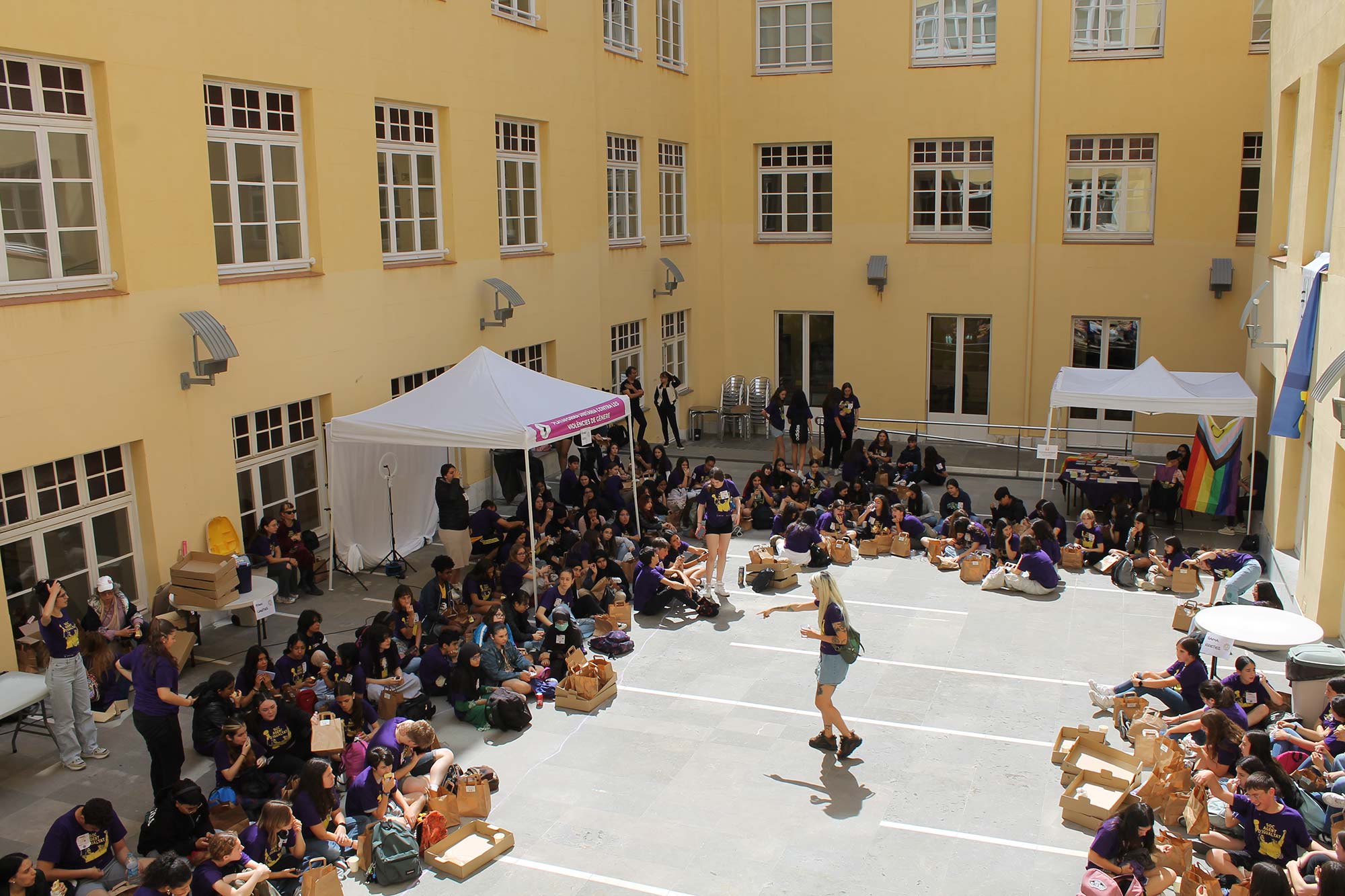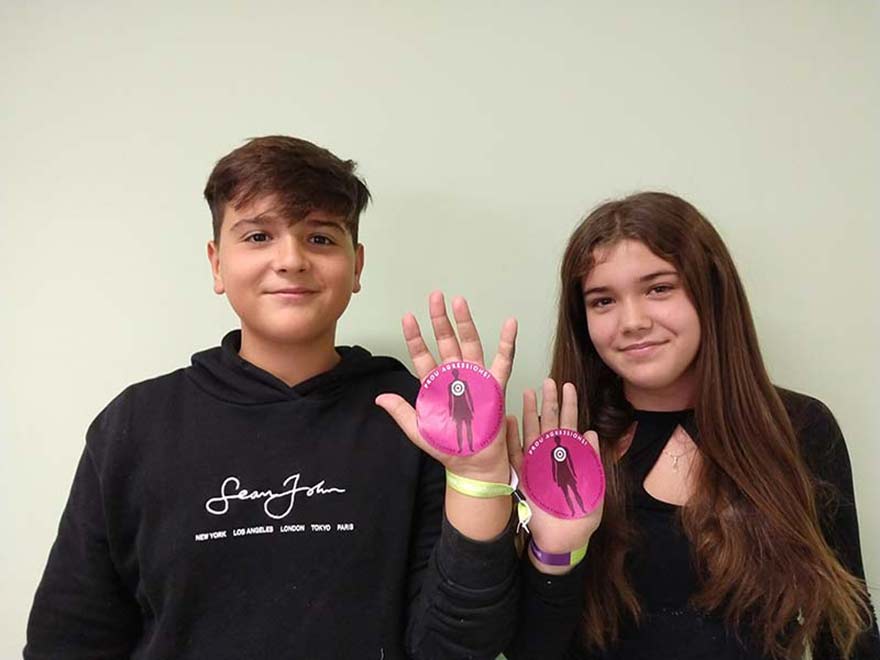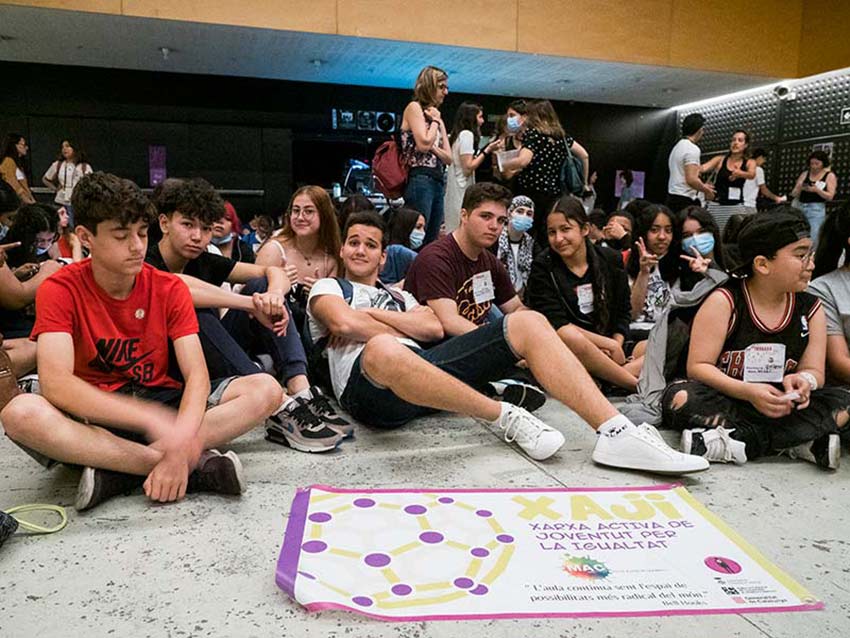



XARXA ACTIVA DE JOVENTUT PER LA IGUALTAT
Since 2012, the Unitary Platform Against Gender-Based Violence (PUCVG) has been working on the Gender-Based Violence Prevention Programme, implemented through peer education and cooperative learning. The aim is to support young people, promoting gender equality, detecting abusive relationships in their own educational environment, and becoming role models for social transformation, and being active agents among their peers. It is a process that usually starts in the 1st year of Compulsory Secondary Education (ESO) and ends in the 4th year of ESO.
The programme equips young people, aged 12 to 17, with the critical skills needed to detect and reverse abusive relationships from a critical and committed position, in favour of equity and coexistence through the consolidation and monitoring of the Active Network of Youth for Equality (XAJI).
Each centre formulates the project differently, centering around an optional subject, community service and/or tutoring. This is as well as additional networking between various educational centres, and services and resources in the same territory.

Is a tool for social transformation. Feminist pedagogy, affective-sexual education and the incorporation of gender perspective are necessary throughout all educational stages to prevent abusive relationships and inequality.
Of all forms of inequality and gender violence is education in equality, through co-education, since we understand violence as a learned behaviour and, therefore, modifiable. Socialisation which is free of sexist stereotypes and gender roles for young people, and the re-education of adults and adults in equality, are ways that can help us avoid falling into the dynamics of domination.
- The empowerment of young people.
- Young people committed to equality, with tools to detect sexist violence around them.
- The creation of fair and equitable relationships within the framework of a culture of peace and non-violence.
- Educational centres that create mechanisms to deal with relationships between peers
- The development of sensitising and transformative initiatives
CENTRES AND THE PEOPLE ADDRESSED
- A group of 20-25 young people from 1st year of ESO until 4th year of ESO.
- They are at the centre of the programme and the actions that derive from it.
- They participate actively and voluntarily and gradually become agents of change and transformation in their educational centre.
- The centre’s faculty members.. The involvement and knowledge of the members of centre’s faculty are essential for guaranteeing the success of the project.
- The educational centre’s person of reference. There must be a person within the centre who guarantees the will to develop the programme, who can support the young people of the XAJI with everything they need and who can act as a bridge with the rest of the faculty, if necessary.
- XAJI coordinator. Monthly support from a coordinator. This support will help to consolidate the XAJI group, the bond between its members and their sense of belonging. It will enable spaces for reflection to be created and knowledge of the group to be built over the 4 years.
This is the initial phase of the programme, where motivation is given and the proposal is explained to the class groups. This is where the young people, freely and voluntarily, choose to become active agents of change and transformation.
The XAJI groups are formed.
Normally, we do a brief classroom introduction, where we detail the project, explaining the various areas of the course in which we want to consolidate the network. At this session the volunteer group (15-20 people), who will initially remain throughout the process, is formed.
This phase is transversal and is done by combining support sessions and specific training.
Throughout the process, each XAJI group is given personalised support. They will have a coordinator as a reference who will support them over the years. This person acts as a liaison between the centre’s reference person, the youth groups, the expert entities that provide training, the PUCVG and the other territories.
The objectives of the support sessions are:
- To identify the needs of the group.
- To provide a safe space for the group of young people.
- To create synergies among the different actors.
- To plan and programme each course.
- To organise sessions and community meetings.
- To guarantee a safe space in each session so that young people can share their concerns, doubts, experiences, etc.
- To carry out awareness-raising actions within the educational context or on a municipal and/or district level.
- Qualitatively evaluate the impact of the process experienced throughout the course.
This corresponds to training with specific content being carried out, which is facilitated by entities specialised in the prevention of gender violence, and entities which are experts in different subjects that make up the working group. These groups participate in the construction, development and evaluation of the project. Training is key in the process of empowering young people to acquire learning that generates actions and attitudes when it comes to becoming agents of equality.
The training is done over the 4 years of the project. The young people will receive 3 training sessions each year and a total of 9 training sessions of 2 hours each. This will depend on the group, the centre and the level of commitment they have agreed to.
Entities and content of the training:
Introduction to gender perspective: Cooperativa Cúrcuma
Masculinity: Homes Igualitaris
Femininity: Apoder ART
Sexual diversity and LGBTI: Miquel Salbanyà
Male violence and partner relationships: Gogara
Perception of the centre’s space and the interventions : Col·lectiu Punt 6
Phase III. Mentoring
The final year of the project becomes a process whereby the already consolidated group acts as mentors for the new group that is being formed. The idea is that the group supports a new group and together they can carry out their preventive work.
The idea is that two groups co-exist in the same educational centre, one with expertise and experience and one that starts the process; there is a handover and joint work to be done, guaranteeing preventive work within the centre.
Meetings (each year at the end of the course)
Every year there is a meeting in May, where all existing networks can share their experiences and do some networking. In addition, there are two annual meetings: one in October or November and one in May, where all the existing networks can share their experiences and do some networking.
